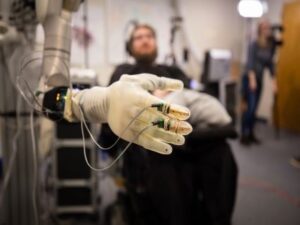Scientists have warned that the deadly “zombie deer” disease, which affects cervids like deer and elk, could potentially evolve to infect humans
 Scientists have long expressed concerns about prion diseases, such as Chronic Wasting Disease (CWD), jumping to humans. A recent alarming report suggests that this “zombie deer” disease could evolve to affect humans, potentially triggering another pandemic. According to the report, which was obtained by Daily Mail, the disease has already started appearing in feral pigs.
Scientists have long expressed concerns about prion diseases, such as Chronic Wasting Disease (CWD), jumping to humans. A recent alarming report suggests that this “zombie deer” disease could evolve to affect humans, potentially triggering another pandemic. According to the report, which was obtained by Daily Mail, the disease has already started appearing in feral pigs.
While the chances of this occurring are rare, the disease, which mainly affects deer, elk, moose, and other cervids, could potentially cause dementia-like symptoms and eventually lead to death in humans. Dr. Michael Osterholm, a leading infectious diseases expert from the University of Minnesota, highlighted that the disease might spread to domestic swine as well, creating major concerns for the livestock market. He also warned that if feral pigs can contract the disease, it raises the possibility that domestic pigs might too.
The report, funded by the Minnesota Department of Natural Resources, indicates that CWD could be transmitted to humans if they come into contact with infected animals, especially when hunting deer. Even cooking the meat does not guarantee the virus is killed. The disease manifests in animals with symptoms such as drooling, confusion, weight loss, aggression, and unsteadiness, typically appearing about a year after infection. The prions causing CWD can spread through saliva, urine, blood, and feces.
CWD has been rapidly spreading and is now present in at least 33 U.S. states, including Wyoming, Colorado, Pennsylvania, and Wisconsin. “We know that people are being exposed to CWD through consumption of infected meat,” Dr. Osterholm explained.
Chronic Wasting Disease (CWD) is a fatal, incurable prion disease that has no vaccine or cure and could potentially evolve to affect humans in the future. Prion diseases occur when proteins in the body misfold, leading to severe neurological damage and eventual death. CWD primarily affects animals with hooves, similar to other prion diseases such as mad cow disease (bovine spongiform encephalopathy) in cows and scrapie in sheep and goats.
Concerns over the virus infecting humans escalated in April 2024 after several individuals were diagnosed with Creutzfeldt-Jakob Disease (CJD), another prion disease. While the CDC later confirmed no cases of CWD in humans, experts remain wary of the potential for a spillover event. Dr. Cory Anderson, co-director of the Center for Infectious Disease Research and Policy, cautioned that if the disease jumps to humans, it could lead to a public health crisis, similar to the chaotic spread of mad cow disease in the UK. “No one is saying it’s definitely going to happen, but we need to be prepared,” Anderson stressed.








